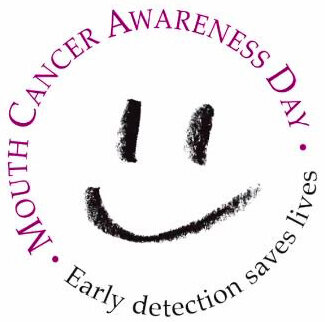Mouth, head and neck cancer - the signs and symptoms
Mouth, head and neck cancer can present in a number of ways and can mimic some common complaints.
Symptoms of mouth, head and neck cancer include:
A sore or ulcer in your mouth that does not heal
White or red patches inside the mouth
A lump in the mouth or neck
Thickening or hardening of the cheek or tongue
Difficulty chewing, swallowing or moving the tongue
Numbness of the tongue or face
A persistent sore throat and hoarseness
Persistent nosebleeds and a stuffy nose
Unexplained loose teeth
Early detection saves lives. When in doubt, get it checked out. Remember that these symptoms can also be due to complaints other than cancer. However if you have any of these symptoms for more than three weeks, it is important that you seek advice immediately from a dentist or doctor.
Please do not present to either a Dental Hospital or a General Hospital without first speaking to your general dentist/doctor.
What is mouth, head and neck cancer?
Cancer is caused by a change in genes that control the way cells function. These genetic changes can be caused by external factors, like smoking, alcohol and certain viruses and can sometimes run in families.
The parts of the mouth, head, and neck that can be affected include:
oral cancer - lips, tongue, gums, cheeks, hard palate (roof of the mouth) and floor of the mouth
oropharyngeal cancer - soft palate, back and side wall of the throat, base of the tongue and tonsil
cancer of the nose and nasopharynx (where the throat joins the nose)
cancer of the face, salivary glands and ear
cancer of the larynx (voice box)
The most common tissue type of mouth, head and neck cancer is squamous cell carcinoma. Other types of mouth, head and neck cancer that may occur include:
Lymphomas
Salivary gland tumours
Melanomas
Sarcomas
There are currently over 700 cases of mouth, head and neck cancer in Ireland each year. It is most common among those aged 55 or older but the number of cases in younger people is increasing. While it used to be 6 times more common in men, the number of cases in women is increasing and the difference is now only 2 to 1. Case numbers are set to increase by 30% in the next 25 years.

What increases your chances of getting mouth, head and neck cancer?
Watch this video to learn more about the risk factors for mouth cancer.
A number of risk factors may increase your chances of getting the disease. These include:
Smoking
Alcohol
HPV (Human papilloma virus) – which may be passed on through sexual contact including oral sex
UV exposure from the sun or sun beds - particularly to the lips and face
Poor diet- not eating enough fruit and vegetables may leave you more susceptible to cancer
How to reduce your risk
Do not smoke. If you do smoke, plan to quit
Limit your alcohol consumption
Always use a lip balm and face cream with sun protection (SPF 30+)
Eat a healthy diet high in fruit and vegetables
Check your mouth regularly for changes, for example, when brushing your teeth
Attend your dentist regularly for a check-up, even if you have no teeth and wear dentures.
HPV Vaccine (for school children - this will reduce their risk as adults)
How to check yourself for mouth, head and neck cancer
A step by step guide on how to check your own mouth:
You can check yourself for any of these symptoms by using a torch to check inside your mouth, tongue, lips and throat. You can also check your neck and jaw by gently feeling for any changes.
It is important to know your own mouth and to notice any recent changes. You can check your lips and the inside of your mouth for any of the symptoms listed above using a good light. It is also important to be aware of any changes in your neck.
What to expect at the dentist
Early detection of mouth cancer greatly improves the chances of survival.
Dentists have a key role to play in the early detection of mouth cancer and in the prevention of the disease by advising on risk factors. When you attend your dentist, a mouth cancer examination should be part of your routine dental check-up. The examination is quick and painless.
How mouth cancer is diagnosed
A dentist or doctor will examine your mouth, head and neck. If they are concerned, they will refer you to an appropriate specialist who will carry out some further tests. These may include one or more of the following tests:
X-rays, MRI scans, Ultrasound
Endoscopy
Biopsy
Treatments for mouth cancer
The treatment for mouth cancer will vary depending on the location and type of cancer and your general health. Your doctors will develop a treatment plan to suit your case which may include one or more of the following treatments:
Surgery - to remove the cancer
Radiotherapy - to kill cancer cells using x-rays
Chemotherapy - to kill the cancer cells with drugs

What to expect during a mouth cancer exam
A mouth cancer exam is part of your routine dental check-up and is painless and quick — it takes only a few minutes. Your regular dental check-up is an excellent opportunity to have the exam.
Here's what to expect:
Preparing for the exam: If you have dentures (plates), you will be asked to remove them.
Your health care provider will inspect your face, neck, lips and mouth to look for any signs of cancer.
With both hands, they will feel the area under your jaw and the side of your neck, checking for lumps that may suggest cancer.
They will then look at and feel the insides of your lips and cheeks to check for possible signs of cancer, such as red and/or white patches.
Next, the roof and back of your mouth will be examined.
You will then be asked to stick out your tongue so it can be checked for swelling, abnormal colour or texture. Using gauze, they will gently pull your tongue to one side, then the other, to check your tongue. The underside of your tongue will also be checked
Finally, they will put one finger on the floor of your mouth and the other hand under your chin, and will gently examine and palpate (press) to check for lumps or sensitivity. You may be referred for further tests but there's no need to be alarmed - there are many possible explanations for a variety of symptoms.
More information and support
If you are concerned about cancer, worried about symptoms or you just want to know more about how you can reduce your risk of getting cancer you can talk to a specialist cancer nurse on the National Cancer Helpline on freephone 1800 200 700. The opening hours are 9.00am-7.00pm Monday to Thursday and 9.00am-5.00pm on Fridays. You can email the nurse also helpline@irishcancer.ie or talk to a nurse live on cancerchat or talk to others in the cancerforum at cancer.ie



